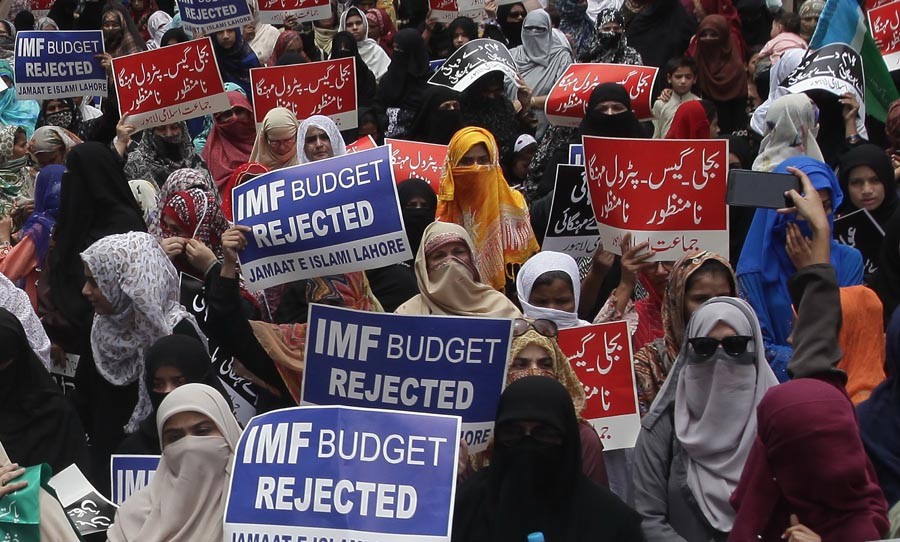
Though people’s development agenda must be at the centre of budget, for the last seventy years poor people are counted just to be taxed

It is always an uphill task for ordinary people to understand the buzz words involved in budget like GDP, economic growth, inflation, exchange rate and other technical vocabulary. Even an economic expert cannot rely on the basis of calculations in the budget for a lot of juggling with figures. It is therefore always near to impossible to get into the real picture of the economy.
In Pakistan, a crop of economic scientists (sometimes imported Baboos) is always available who are adept at twisting the economic facts in whatever direction they like in order to hold political ground of a party to which they are affiliated. This raises a very serious question of accuracy of our economic planning and projection. This is for the same reason that every new government in Pakistan challenges the economic progress claimed by the previous government.
Without going into numbers, the fundamentals of an economy are very simple and easy to understand. Just take the example of one household head: what amount does he earn and what amount does he spend. If he has sufficient earnings to meet the basic needs like food, housing, education, health, transportation etc. than his domestic economy is in good health but if he is unable to meet these basic needs than there is a serious flaw not only of economic planning but also misplaced priorities of the state and its institutions.
If a large chunk of population, some sources put it above 40 percent of total population, is unable to get access to basic rights like food, housing, safe drinking water, education then in common parlance budget will be termed total failure. This dismal situation goes against the essence of our constitution which offers guarantee for these basic rights. It is a matter of grave shame that after seventy years our state finds it unable to provide basic needs to its citizens.
The same formula may be applied to the country to assess its economic situation: volume of imports and exports, collection of revenues and extent of expenditure to begin with the macro economics. A cursory look over some past years reveals that our economic indicators are extremely poor in these areas. Our export-base is shrinking for multiple reasons; agriculture produce which is backbone of our economy is on decline, energy deficit coupled with high prices renders a heavy blow to our economic growth, our tax collection system is inefficient with narrow tax base, national institutions like PIA and railways are running into losses and our expenditure goes far beyond our revenues to name a few broader problem areas. This situation is going on for many decades.
Keeping in view the history of our economics, it is feared that we are to pass through the same vicious cycle for generations to come because there is no light at the end of the tunnel as yet. Many governments took humdrum economic interventions with myopic vision just to pass the tenure rather coming up with drastic structural reforms. Thus, our economy is still directionless.
The ingredients of our budget do not take into account the basic needs of people to the full extent. With little or no change, the government is following almost the same budgetary patterns and the same strategic interests. But now situation demands a sea-change in the overall design of budget. For example a family always prioritises resources toward food, housing, education, health and transportation etc. But unfortunately our state assigns remaining resources to these areas after debt servicing and defense. The result of this approach is abysmal cycle of poverty and under-utilisation of human resources.
There is another mantra of every government that people don’t pay taxes but on-ground situation is different altogether. People always pay heavy and regressive indirect taxes on everything which hit the people living on the margins. In fact they pay taxes from matchbox to petrol. The government relies heavily on indirect taxes to enhance its revenue collection instead of imposing direct taxes on privileged lobbies. Tax evasion is protected by feudal, political and bureaucratic forces who have vested interest in it.
The need of documentation of economy cannot be overemphasised. Everyone must be accounted for with one’s full sources of income and not exempted from tax under normal circumstances. At the moment the rich pay only 5 percent of taxes and for the remaining 95 percent, the poor are forced to pay indirectly.
Another missing link in the budget-making process is the absence of true representation of people and their problems. Officials responsible for preparing the budget play with figures without realising the impact of these figures on the lives of millions of people. They are totally isolated from the ground realities. For example tens of thousands of people are suffering from water-borne-diseases not only in rural but urban areas. Has any budgetary line provides sufficient provision for it to minimise the extent of problem?
This incumbent government has been advocating for promotion of tourism in northern areas of Pakistan. It is very painful to observe that the four kilometre pipeline from Donga Gali to Ayubia, which was laid by the British some hundred years ago to provide water to Murree, is not covered. Let alone the expansion. Therefore, local population is forced to drink this contaminated water. The question is how can we promote tourism with this poor infrastructure? This is just tip of the iceberg to gauge our budgetary allocation priorities.
Budget is for people. So people’s development agenda must be at the centre of it. For the last seventy years poor people in Pakistan are counted just to be taxed. This practice must now be stopped. All must be taxed in a just way.